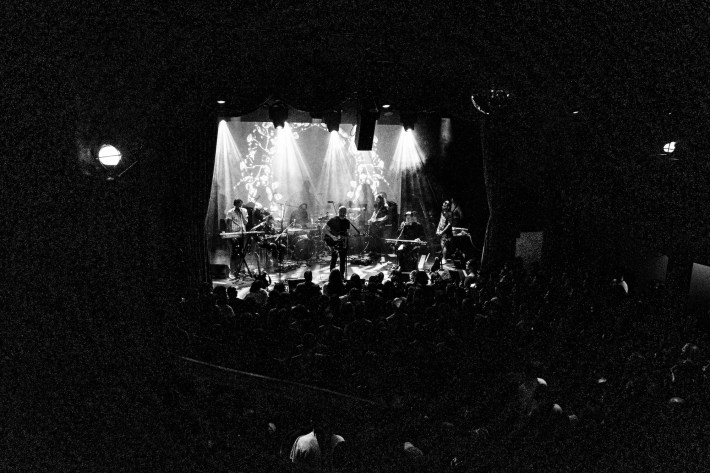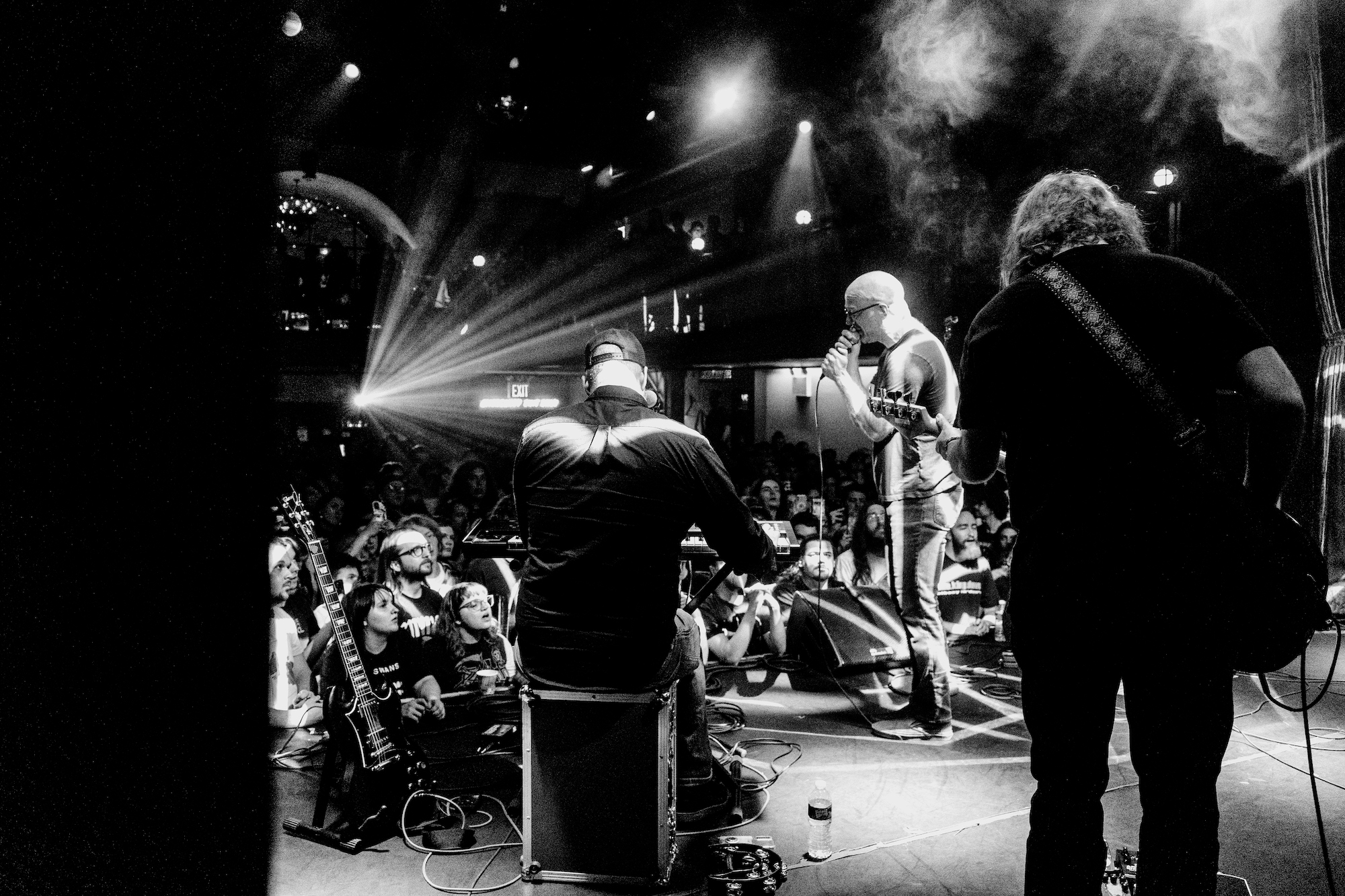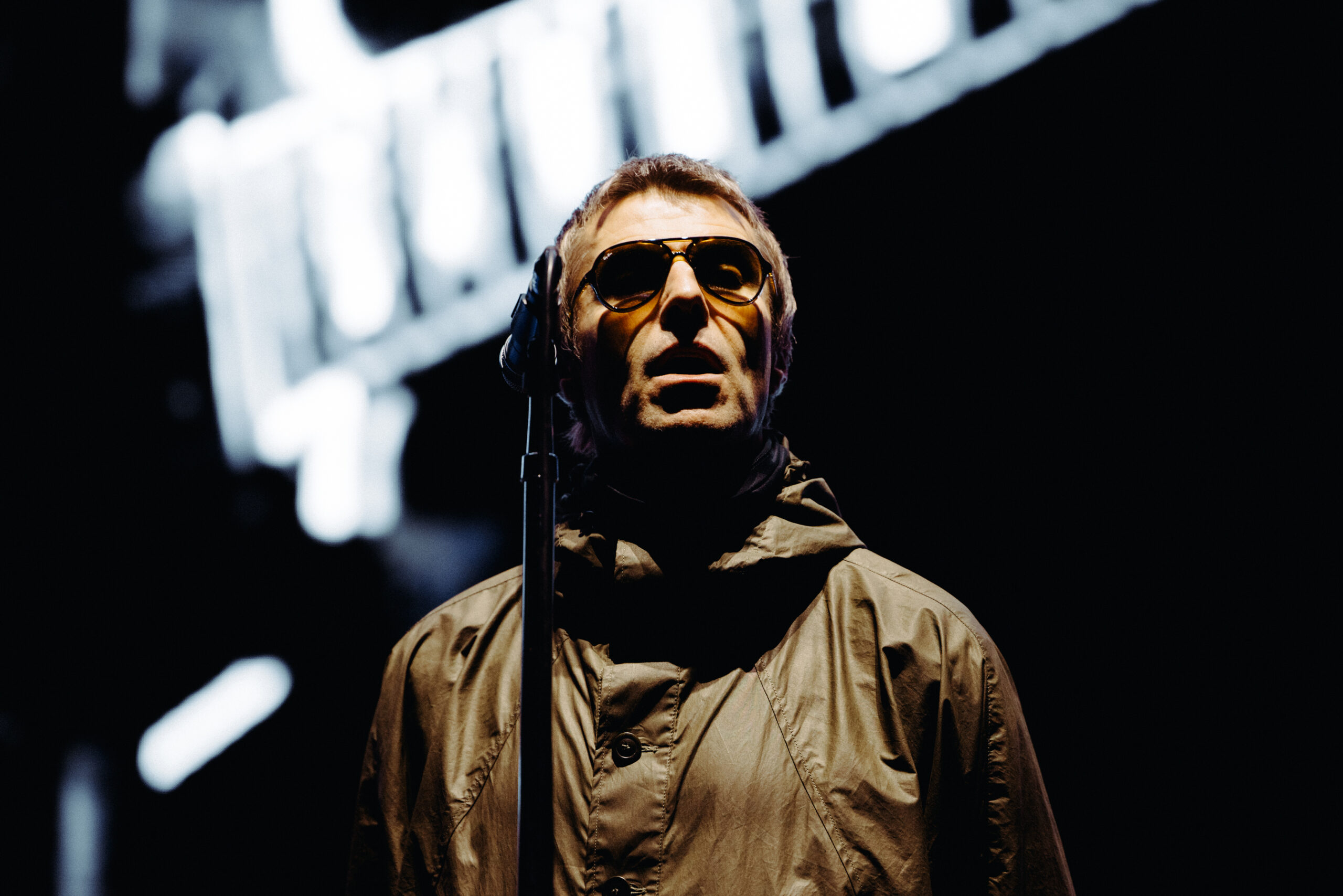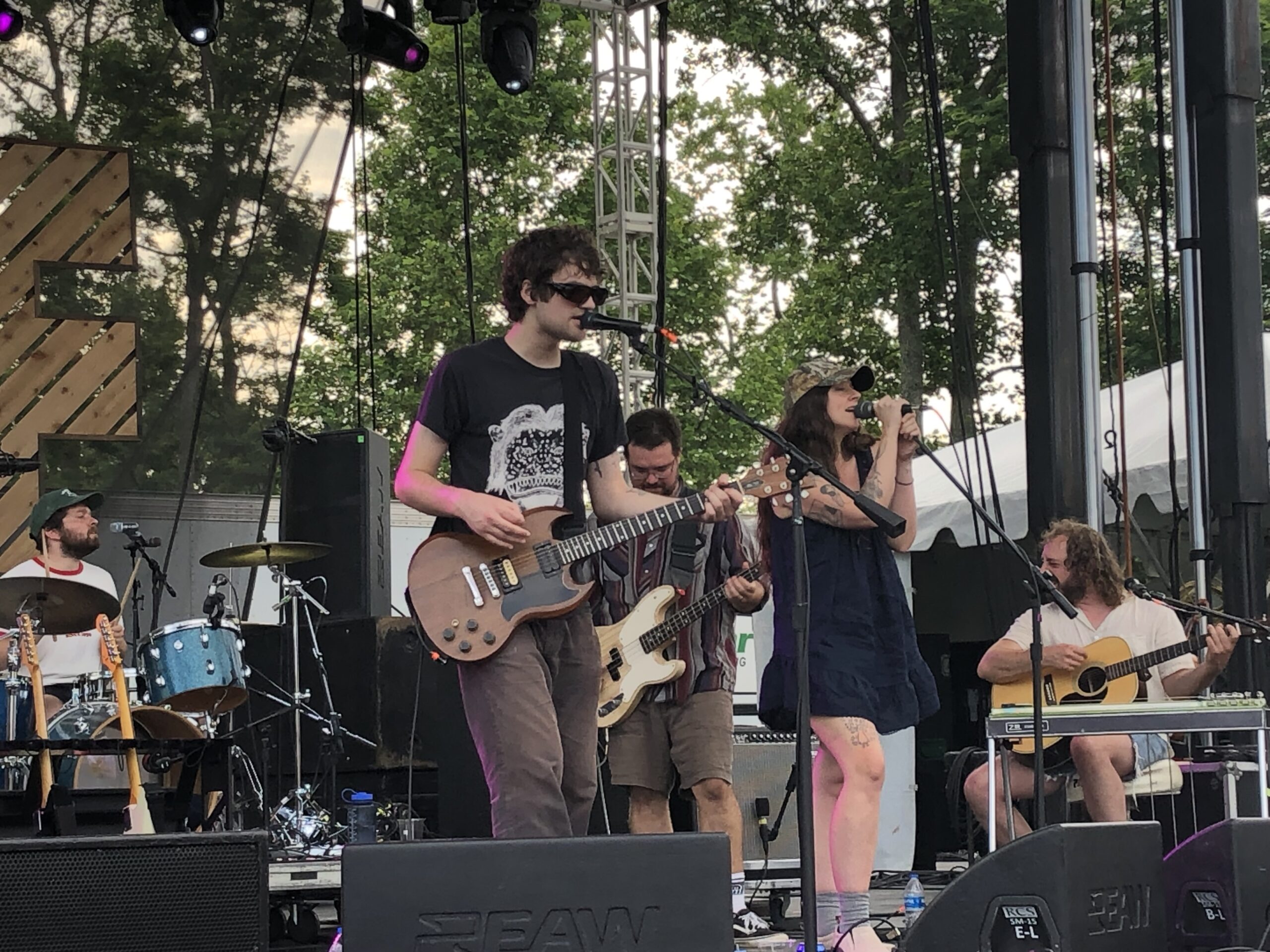Giles Corey died on the third day. A landowner and father of five children – among them, a daughter named Deliverance – he refused to plead before the jurors for the charge of witchcraft. He was pressed, a technique of torture obsolete by the turn of the eighteenth century, but rather than confessing or agreeing to a trial, he laid there naked beneath the planks while the sheriff added stones, splintering his ribcage against his organs. The court gave him three chances to save himself but he made only one request. His last words: "More weight."
"I never thought that I'd be here, and you'd be there," Dan Barrett, the 43-year-old Have A Nice Life vocalist, said before his last song as Giles Corey on Friday night, gesturing toward the crowd. The dark-experimental label The Flenser was hosting a showcase at the Bowery Ballroom in Manhattan, the first of two consecutive nights. Thom Wasluck's doomy post-metal project Planning For Burial opened, selling shirts that read, aptly, "I came to Have A Nice Life but Planning For Burial ruined my hearing" (I myself had forgotten earplugs and enjoyed a justified tension headache). Then Midwife, blonde bangs peeking beneath her bulky headphones, took the stage, transfixing and devastating with her ethereal, shoegazey soundscapes (and one chord progression that sounded undeniably like "When I Come Around"). Barrett's two projects followed – first Giles Corey then Have A Nice Life.
Barrett continued, "You could just keep making the decision to be here, and be okay," and I realized then that this was no typical frontman gesture of humility but instead a commiseration about survival. "It would mean a lot to me," he said, "if you would keep doing that." It was a self-selecting room, wall-to-wall with people who knew what he meant, who probably needed to hear it. His music has occupied a cultic place in depressive subsets of the underground since the internet's fanatical discovery of Deathconsciousness, Have A Nice Life's cathedral-shaking debut, which cost Barrett and collaborator Tim Macuga less than a thousand dollars to make and which remains affixed high on 4chan's /mu/ essentials list.
Morbid, ambitious, densely orchestrated, by turns barbituric and corrosive, Deathconsciousness describes a kind of apocalypse that follows, as one might guess, the recognizance of one's own mortality. A man kills God, another prays for a time machine to commune with the deceased, golems overtake the world. In the 15 years since its release, the album has grown in stature and mythos and represents now a sort of shorthand for a scene, a spirit, a psychic place; it's a frequent "saddest album of all time" contender, right beside Mount Eerie's A Crow Looked At Me. This is the kind of music you can expose yourself to as an act of masochism. It's the kind of music you listen to when you want more weight. On the scuzzy post-punk track "Waiting For Black Metal Records To Come In The Mail" (none of the humor is lost on them), Barrett sings, almost inaudibly, "I guess I thought I'd feel something, but I didn't."
Barrett had come out in a black T-shirt and black jeans, like a man dressed-down for a funeral. (It would have seemed strange for him to have worn anything else; we were, more or less all of us, wearing the same thing, black jeans and black T-shirts, all of us dressed-down for the same parking lot vigil.) There was a large screen behind the band displaying a series of monochromatic projections to match the grays of his macabre self-titled album cover, further discomfiting the abject folk songs. Some time into the set, the crowd was activated by a simple haunted-nursery-rhyme synth phrase, insidious like the ringtone in One Missed Call, splitting the difference between preludes for Death Grips and Metallica. So began "No One Is Ever Going To Want Me," Barrett's most-streamed song. The screen glowed red with new images, an H.R. Giger-esque helix, and a sense of feral possibility seized the ballroom, the ignition of a force terrible and unstoppable.
But Barrett was kneeling down fiddling with something, and then a sound tech ran back onstage, whispered in his ear, and he stopped the song. His guitar strap had broken. It had been a while since he'd put such strain on it. He clamored to the microphone. "Alright," he laughed defeatedly, "I wasn't planning on talking to you yet, I was going to be cool!" Scattered laughter. People behind him were scrambling. "I have three nine-volt batteries in my backpack but just this one old-ass string holding my guitar to its strap," and it was unclear then what would happen. Whether he'd sit down, trade guitars with someone. Then Richard – on guitar, percussion, and later synths – tapped his shoulder and handed him a shoelace, which he managed to graft onto the frayed fibers with the help of his wife, who had been watching from the wings. He stood with his new jerry-rig. "He's going to do it!" joked Macuga, in a trucker hat and jeans. Good crowd for gallows humor.
"Let's rip," Barrett hissed, and the notes started again. The helix on the projector clarified into discernible shapes, actual bones, ribs, femurs, connected in a monstrous, troubled configuration. The song sounded darker, less like a lonesome organ player and more like a seance, a summoning of something infernal. The eight-minute canticle, intimate on the studio version, traded its muted industrial fog for a heavy metal wall of sound, ripping power chords and clashing cymbals courtesy the formidable six-piece. The shaker and tambourine clattered like chains. Barrett traipsed to the lip of the stage and bent down real low, before screaming "ONE, TWO, FUCK, YOU!" and the band kicked it up. For the first time during his otherwise elegiac set the people toward the front of the pit started throwing their bodies together, heaving in a ritualistic circle. From the mezzanine where I stood, they looked like a nest of worms pushing the soil. He stayed there screaming with them, "I wanna feel like I feel when I'm asleep," the room shouted. And then just, "I wanna feel! I wanna feel! I wanna feel! I wanna feel! I wanna feel! I wanna feel! I wanna feel! I wanna feel!" More weight.
In the book that accompanied Giles Corey – an etiology of suicide, self-asphyxiation manual, novel-in-verse, fictional biography of a cult leader, Sebaldian picture story, et al. — Barrett acknowledges Corey's agency, that he could have chosen a more humane death, he could have chosen to go quickly. From Medieval law, the method of pressing was known as peine forte et dure, or "forceful and hard punishment." "He made them murder him. He made it ugly," Barrett writes. Barrett seems to feel that this was a political act, underscoring the immorality of execution, pointing to the fact of its nonnecessity – there is no justified taking of life. But I wonder whether there wasn't some other solace Corey, a man of faith, found in the torment, that his obstinacy was a kind of piousness. Maybe there is no absolution without suffering. (I wanna feel.) Barrett reportedly wrote the record in the wake of a suicide attempt, during a period of anguish that begot a search for answers, which came in the form of the questions themselves, in the form of the album. Like Infinite Jest, it was the product of a man trying to determine whether or not a person should keep living. Unlike Wallace, Barrett did.
The album opens with "The Haunting Presence," a baroque, thorny requiem, part Gregorian chant, part gravedigger's lament, that sinks deeper, by Dantean means, into chthonic substrates of fuzz and screaming. "I don't care if I live or die," he howls. (Later, in its final moments, the album concludes the way it began, reprising the same progression on guitar rather than keys, and relieving the old words of their fatalism.) When he played it on Friday, the stage was blue.
First the sinister, papal piano phrase. Barrett set his guitar down. As the notes played, he matadored around the stage ("I've been pacing like a man in a prison cell"). He rubbed his hands together like a physicist at Trinity, nervous for something huge and inconceivable for which he was both responsible and unprepared. By now his spells had enchanted, or else cursed, the room. We'd all been transformed. Soon his language devolved into unintelligible ululations, one hand covering his eyes, the other around the mic, surrendering himself to the seismology of the musicians around him. Behind them, video footage of men either mining or preparing a burial plot. He finished the song on his knees, facing the drum kit. Supplicating.
When the song was over it was like something extranatural had happened to the room, as if we'd all watched the stage electrified by unlikely lightning or a flash flood. An unspeakable collective event. Barrett returned the mic to the stand. "Hi, we're Giles Corey," he said brightly. "How are you?" The crowd was quiet for a second, trapped in the enormity of what we had endured together, and then the catacombs came to life with a roar. Barrett followed his small talk with an admission: "We're happy," he said. Then, quieter, "Happy," he repeated, as if the word were foreign, had surprised him in his own mouth.
The intrusions of the banal over the course of the night were conspicuous and palliative. It was possible to become lost in the woods. Demystifying our communal hypnosis, Barrett introduced the man behind the visuals, an artist named Cody in tiny shorts and white sneakers who controlled everything we saw with a PlayStation remote. Between sets, Waxahatchee's spry Americana band with Jess Williamson, Plains, was playing over the house speakers. Katie Crutchfield's Alabaman timbre was an unexpected palate cleanser, countervailing the ambiance. As an enterprise of comic relief while I waited for the band to return to the stage, I collected a list of T-shirts as if I were birdwatching: Cremation, Radiohead, Sunny Day Real Estate, Witch, Swans, Twin Peaks, (somewhat unbelievably) Parquet Courts, Black Midi, Mount Erie [sic], Sun Ra Arkestra, Godspeed You! Black Emperor, the Jesus Lizard, Paradise Lost, Drug Church. When the ensemble returned as Have A Nice Life — the same players as before, though a few had traded instruments — Barrett had taken off his glasses. There was something funny about this costume change, as if he were pulling one over on us. Or else like he'd gained, in the interim minutes, some new strength, post-bite Peter Parker.
Have a Nice Life’s set was far more raucous. As if Giles Corey had possessed us, Have a Nice Life performed the exorcism. Macuga traded keys for electric guitar, jerking the whammy bar like a saw. Percussion like gunshots, sweat formed a kind of mist over the pit. All gothic violence. They closed with Deathconsciousness’ sprawling operatic finale, “Earthmover.” Barrett backed away from the mic and belted, distorting the sound as if he were keening through a bullhorn to a stadium. After the first verse, as Macuga and Joe Streeter’s gain-driven guitars dueled feverishly, Barrett wrapped the mic wire around and around his neck. (I want to talk about the Voor’s Head Device.) The spotlights roved around the stage as if each player might be abducted and taken someplace far from this world. Unnoosed, flooded in red and alone at last with Macuga’s guitar, Barrett quavered, "Nothing hurts them, nothing gets under their stone skin." At the end of it all, after the house lights came on and the empty beer cans were crushed underfoot, our damp congregation stumbled out into the night dazed and reverent. Jolted and emptied out.

Over an hour earlier, Barrett had introduced only one song as Giles Corey. "This song is called 'Blackest Bile,'" he’d said, knowing his audience well enough to understand the significance. The first time I heard it was in a small dorm room in an old equestrian town an hour north of Albany. I didn't know much about the trials in Salem beyond what made the AP US History curriculum, and I hadn't read The Crucible when it was assigned to me in high school, so I didn't realize that Giles Corey wasn't just the guy's name. (Until recently, I pronounced it with a hard ‘G,' a portmanteau of 'guy' and 'aisles' that telegraphed my ignorance.)
The album was always playing from his desktop speakers. In my memory he had a PC, which accords with my impression of him as defiantly analog — he had an android phone, as if he weren't elusive enough already — but I can't be sure about much about that room, though the light was always orange and he hung a Money Store poster next to the bed. Giles Corey self-titled played while we had sex, which horrifies most everyone I tell, but to me there's something romantic about it — its Heathers-caliber juvenile self-seriousness, its embarrassing melodrama, its Freudian frankness about the proximity of sex and death.
My body learned the album cellularly. Like the smell of his laundry detergent in an unexpected stairwell, the notes and their order were preservatives, storing the memories someplace corporeal. Through the music, the room was preserved in my body. I didn't really know the words so much as I knew the sounds and where they went. I knew the landscape of the songs. When I saw that The Flenser was doing a showcase that would feature a Giles Corey set, something Barrett has only done a handful of times in the long history of his career, I thought maybe I would see him again, the boy from the dorm room. Of course he was no longer a boy with an android and was now a man with an iPhone and an apartment and houseplants and a real job, but there was a part of him who, I had to believe, was also preserved in that room, a part of his body which had also preserved those songs. "Blackest Bile" was the one I remembered him talking about most, mentioning in conversation with the other guys on campus with radio shows like ours, the one that I most associated with him and with the time we spent there.
He wasn't at the show. I stood alone on the balcony overlooking the stage. It was cold and I was underdressed. "This song is called 'Blackest Bile,'" Barrett said, and I knew that I shared something with the hundreds of people around and below me, a kind of sadness or understanding of it, but none of them had been in that room with me, they had all been in their own rooms, maybe of the same kind, maybe in some cases in each other's rooms, but for my part I was alone. I burned with the injustice of this, that he should be there with me, if for no other reason than to prove to myself that it had happened. He had given this thing to me, for better or worse, and now I was alone with it.
For years I couldn't listen to the album, but I revisited it, finally, during the pandemic, when I wanted to remember what it felt like to be in a room with other people, even a dark one, to feel anything other than the material and metaphysical frustrations of apocalyptic dread. I had remembered "Blackest Bile" as a gloomy, irredeemable dirge, a statement of malicious intent and its perpetration. But on the back porch of my dad's house in the country, I listened to Barrett's voice through a pair of shitty earbuds. "It hasn't been easy on you," he sang. It was a love song. It was an apology, like so many great love songs. And the boy in the dorm room hadn't been trying to hurt me, hadn't been trying to create an atmosphere of cruelty, but instead, I saw then, he had tried to surround me with remorse. This was a kind of pleading. A guilty plea, for the humane way out.
I watched Barrett on the stage, rocking back and forth with his acoustic guitar. Behind him on the screen a tessellation of lights, a kaleidoscope cracking open and righting itself. In the front a line of people who had only minutes earlier been thrashing and punching and knocking each other around threw their arms around one another's shoulders and swayed in time with the music. I guess I thought I'd feel something.

We rely on reader subscriptions to deliver articles like the one you're reading. Become a member and help support independent media!






